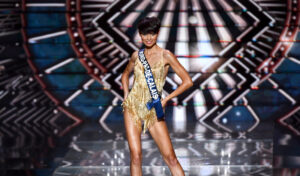Greta Thunberg has never been a party animal. In a 2021 podcast, she said she had never been in a bar, spending “all my waking hours when I am not in school constantly working and being an activist”. She also said she had no desire to ever get drunk as this is “not who I am as a person”. So when she turned 21 on Wednesday, it feels safe to say that celebrations won’t have been raucous. And there definitely won’t have been candles — just think of the carbon footprint.
It’s easy for jaundiced old gits like me to laugh at the serious-minded puritanism of today’s youth. But Thunberg seems to arouse far stronger and darker emotions in many than a desire to gently take the mick. On the one hand, there are those who fawn excessively, treating her as a tiny omniscient oracle. And on the other are the people for whom the mere mention of her name leaves them purple with fury, putting them in mind of everything they hate about modern progressivism.
Many of her most ardent fans in the first group are well into middle age, and their veneration is frankly a bit weird. Take the 40-something British novelist Elizabeth Day, interviewing Thunberg for the aforementioned podcast with cringing deference, describing herself as a “stan”, and introducing her interviewee to listeners as “a global icon, an inspiration to millions, and still only 19”. At one point, Day exclaims covetously: “I wish I had your mind”.
Meanwhile, in a scene from the 2020 documentary I Am Greta, MPs Ed Miliband, Layla Moran, Caroline Lucas and John Bercow cluster round the awkwardly unsmiling youngster in Parliament. Almost genuflecting, Moran prevails upon Thunberg for a selfie, while Bercow, ignoring her evident discomfort, stares into her eyes and pumps her hand for just a little bit too long. In a scene shortly afterwards, the Pope does pretty much exactly the same thing.
Newton’s Third Law tells us that for every force there is an equal and opposite reaction; and this seems to be true in the cultural world just as much as in the natural one. Accordingly, Thunberg has acquired many detractors, particularly among Right-leaning politicians and commentators with aspirations to populism. Perhaps some are envious of her influence; others see political opportunity in bashing a soft and easily mockable target. A number of her most prominent critics in the documentary also come across as somewhat unhinged. Trump encourages supporters at a rally to boo her. Bolsonaro calls her a “brat”, while the Daily Wire’s Michael Knowles calls her “a mentally ill Swedish child”.
Yet it is clear to anyone not already lost in projection that neither the adulation nor the demonisation is warranted. Whether or not you agree with Thunberg’s conclusions about the environment, she is usually just repeating activist talking points inherited from other people. The school strike which kicked off her fame was the idea of a different Swedish campaigner, and the resulting publicity was not particularly grassroots, but due to a well-connected media entrepreneur. And given the history of horrible bullying and social isolation which dogged her in early puberty — eventually causing her to become anorexic, depressed and selectively mute — avoiding school to protest climate injustice can’t really have been that much of an altruistic sacrifice. Whenever she goes off-piste from environmental matters, as she did last month on Palestine, here too she says exactly the sorts of things you’d expect from the average Left-leaning young person these days, complete with preferred pronouns.
But these are not reasons to start frothing at the mouth either — quite the opposite. The point is that this is a young person of a totally predictable type: intelligent but also dogmatic, emotionally immature, somewhat socially challenged, and as yet unaware of the world’s ethical complexity. Her intense idealism, pomposity and black-and-white thinking are all developmentally appropriate, and especially so for someone on the autistic spectrum. And nor is it her fault that her mother is an opera singer, nor that her middle name is Tintin, nor that impressionable idiots keep nominating her for Nobel Prizes, nor that UN officials and world leaders seem desperate to make a heady symbol out of her.
Now that she has reached maturity, the bad news for Thunberg is that it seems likely her detractors will soon outnumber the adulators. For her star power has always been inextricably bound up with youth. Partly this is because the uncompromising purity of her vision initially appealed both to young contemporaries of hers and to fairly simple-minded elders — and many of the former, at least, are by now growing out of it. More fundamentally, it’s because for older fans, her gawky, impassioned protests have made her thrillingly emblematic of children everywhere. Once she is no longer perceived as a child, this particular source of attraction is going to lapse.
Among the liberal middle-classes, we are currently witnessing an outpouring of sentiment about children on a scale last seen in the most saccharine passages of Dickens’ novels: think of angelic Little Nell in The Old Curiosity Shop, beset on all sides by the sins of adults and hurtling towards tragic destruction because of it. On this view, kids are not so much young and undeveloped humans with varying destinies ahead in life as a pathos-saturated victim class — alternately to be pitied, madly identified with, or revered as saintly. And for a while now, Greta has been its star.
The interesting questions, then, are not about her, but about us. In particular, why is there an apparently increasing tendency for adults to identify uncritically with the concerns of children and teens? This is not a question about why many of us care about the environment, or why we worry about what to do about climate change or the fate of future generations. We may even reach roughly the same conclusions as Thunberg, after some thought. The question is more about why some of us ever wanted to switch off our brains and let a 15-year-old do the thinking and feeling for us.
The very same phenomenon is evident in the relatively recent phenomenon of parents, teachers and even trained clinicians uncritically going along with sexual and gender identities that miserable teenagers originally invented on Tumblr, while their unhappy, confused charges head towards the hospital with adult blessings ringing in their ears. No doubt the question is overdetermined, but I think one answer is this: by means of an adult’s elaborate psychological identifications with a childish and simplistic worldview, he advertises to the wider world how babyish, harmless and ultimately blameless he is too. In other words, it’s a good way to rid yourself of felt responsibility and guilt, either for the state of the planet or anything else.
Along with Greta-worship, manifestations of this regressive impetus seem to be everywhere among those of a certain age and income bracket. So many gestures and behavioural choices seem designed to advertise your good intentions and basic unthreatening niceness, imploring the observer not to take you very seriously because you aren’t really an adult either — and certainly not one of those adults who has power or agency over anything important. The desire not to be mistaken for someone with responsibility, I assume, partly lurks behind childless trips to theme parks, adult onesie-wearing, putting cartoon filters on Instagram posts, the ever-growing popularity of Halloween, gaming, and the stockpiling of Star Wars toys. It’s part of the basis for embracing mind-numbingly simplistic instructions such as “be kind”, or the idea that we should just “listen to experts” like obedient little children. It is embedded in silly adolescent swearing, and in the wearing of twee Christmas jumpers, and Mary Jane shoes, and much more besides.
Thunberg was such an effective emblem of this, not just because of her unusually youthful looks and her original Pippi Longstocking aesthetic, but also because her autism makes her un-self-conscious and causes her to appear extra child-like. In I Am Greta, she dances naturally on camera, or cries or sulks or fights with her father, not as a narcissist aware of being filmed might, but like someone who doesn’t yet understand what others see when they look at her. No wonder she has reportedly struggled to understand why no meaningful changes have really happened in climate policy despite the huge hype around her protests. It will perhaps take a few years more for her to understand that many enthusiastic supporters were never really focused on climate action at all, but rather upon getting themselves off the hook.
As with Oscar Wilde’s response to Dickens’s depiction of Little Nell, it would take a heart of stone not to laugh at the most extravagantly fulsome paeans to Thunberg over the past five years. But the real savage mockery should be reserved for those progressives who canonised a precocious, stroppy, literal-minded child for basically self-interested psychological reasons. And we should also reserve some derision for those bitter Right-wingers so consumed with rage at the former group, that they can’t help but hate her for it too. If we can’t give Thunberg carbon neutrality or an end to deforestation for her birthday, a nice consolation present would be to commit to remembering that she is only 21 — and that we are not.
Disclaimer
Some of the posts we share are controversial and we do not necessarily agree with them in the whole extend. Sometimes we agree with the content or part of it but we do not agree with the narration or language. Nevertheless we find them somehow interesting, valuable and/or informative or we share them, because we strongly believe in freedom of speech, free press and journalism. We strongly encourage you to have a critical approach to all the content, do your own research and analysis to build your own opinion.
We would be glad to have your feedback.
Source: UnHerd Read the original article here: https://unherd.com/



